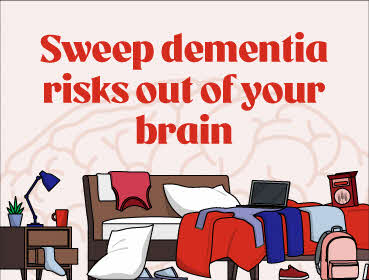Living to 100, part 6: Ways to stay mentally sharp
Blue Zone 2.0: A series to prepare you for centenarian-ship
For many Singaporeans, there is an acceptance that certain physical issues - like your strength and stamina - will decrease as you age. But the greatest fear often lies in our mental health: will we still continue to recognise friends and family, hold conversations, and comprehend the world around us? In 2023, an ongoing study found that, of 818 study participants, about half had signs of Mild Cognitive Impairment (MCI), which is a possible early sign of dementia. There are simple lifestyle changes we can make, however, to stay mentally sharp even in our twilight years:

1. Learn and use different languages
Learning and using multiple languages is a good way to build our cognitive reserve (i.e., our brain’s ability to adapt to damage or deterioration, among other benefits). Simply being bilingual, for example, can provide greater resistance to diseases like Alzheimer’s; so it’s a good thing Singaporeans learn a second language in school!
You can take this further by learning and using more languages. This is much less expensive today, as there are free language learning apps on your phone, as well as online. Also, it’s easy to join language clubs and forums on the Internet, where you can interact with native speakers - this is also a good way to maintain social interaction, on a rainy evening at home.
Bonus: learn a language common in Singapore, and you’ll find ordering food in coffee shops or making new friends much easier.

2. Attend classes and workshops
Community Centres provide plenty of affordable, or even free, classes and workshops: Tai-chi, calligraphy, drawing, etc. are all good ways to meet new friends, while staying mentally stimulated.
When choosing classes and workshops, consider picking something entirely new to you, rather than something already familiar. For example, if you’re already familiar with drawing, consider taking up something adjacent such as painting, or from a different field like music. This serves a dual purpose: it opens up new avenues to explore, while also cultivating new habits and neural pathways.
Neuroplasticity, and the development of new neural pathways, can also aid in recovery from existing damage. It can, for instance, help in recovering from damage caused by a stroke.

3. Stay active and get enough sleep
The mind and body are interconnected; after all, your brain is ultimately another organ in your body. As such, regular exercise and proper sleep are also key to staying sharp. This will prevent certain diseases, such as heart attacks or strokes, from causing damage to your brain.
Regular exercise and proper sleep also help to fight depression, and ensure you can enjoy your favourite activities for longer. Consider that, if you’re still fit in your 70s and 80s, you might still be able to travel and vacation abroad safely. If you’re in poor health however, the flight and travel demands may be too much to handle.

4. If you choose to continue working, take breaks to keep your stress level low
Stress or anxiety causes your body to produce cortisol. While this doesn’t directly cause dementia, cortisol has a negative effect on declarative memory; this means it’s harder to recall details like names, dates, passwords, or bank account numbers.
Studies also show that, while high stress levels may not cause dementia, they can accelerate the worsening of cognitive declines; this can speed up a progression from mild cognitive impairments, to actual dementia.
Some Singaporeans who choose to keep working for health reasons, like a part-time job to keep active. This is good for mental health, but avoid doing it to the point of heavy stress or anxiety. If you run your own business, or are in a senior position, consider “shifting gears” to take on less demanding roles as you get older.

5. Avoid sugar and saturated fats
Studies have linked higher sugar intakes to higher rates of dementia, and the same goes for saturated fats. Beyond the impact on the brain, diets high in sugar and saturated fats also tend to cause heart disease: these can damage the brain through other symptoms such as stroke.
That’s not to say you can’t have the occasional treat of course; but it’s good to be more selective about our diet as we age. Consider following the dietary recommendations of the Health Promotion Board. This might also have a beneficial side-effect: it could mean having to learn some new dishes to cook at home, or going to alternate eating places. And as we’ve established, doing new things is also good for staying sharp.
Finally, ensure proper financial protection against stroke
Despite our best efforts, diseases like heart attacks and stroke may happen. This can affect our cognitive abilities, and we may need time and resources to recover. A comprehensive critical illness plan is essential for this: consider a policy with a 100% lump-sum payout for such illnesses, so you can focus on recovery without stress.
Let us match you with a qualified financial representative
Our financial representative will answer any questions you may have about our products and planning.








